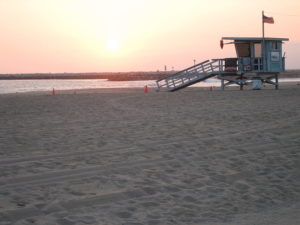
You can read a description of the boundaries of the proposed BID in the ordinance, although it’s a little hard to follow even for someone who grew up out there. The District seems to be bounded roughly by the Boardwalk on the West, by North Venice Boulevard to the South, by Pacific Avenue to the East, and by Rose on the North. Now, I don’t know how much you know about the history of race relations in Venice, but it’s essential to an understanding of the deep politics of this BID1 to know that the area roughly bounded by Electric Avenue, North Venice Blvd., Lincoln Blvd, and (maybe) Brooks Avenue, known as Oakwood, was originally the only area of Venice that non-white people were allowed to own property in. Thus ownership of commercial property in the area encompassed by the proposed BID, like most such areas in Los Angeles, was restricted to white people only until sometime in the late 1960s, and then only as a matter of law. There is no question that the huge majority of that property is, even now, due to the way that commercial property is passed down in families, owned by white people.
Here’s what this means for the BID. The City of Los Angeles has taken a kind of time-capsule of vicious racial segregation in Venice that, presumably, would fade out eventually through intermarriage and other such forces and, through an exercise of its governmental power, has crystallized it into a BID and granted it political power of its own. In other words, with the formation of the Venice Beach BID2 the City has resuscitated what was formerly a fading stronghold of white supremacy, granting it new life, new power, and a new role to play in City politics. That role will include an inordinate amount of power over the disproportionately nonwhite homeless population of Venice, just like the zillionaire elite had in the bad old days of explicit white supremacy in Los Angeles. Residents of Venice can’t vote for or against the BID’s establishment, they will have no say whatsoever over its policies, and they will have essentially no way to get rid of it once it’s put in place.
This is surely insupportable. In an age when courts routinely use the California Voting Rights Act to rewrite city charters to make minorities more electable, it’s not plausible that the City’s actions to re-empower white supremacy through this BID and others similarly situated in Los Angeles could stand up to a vigorous challenge on these grounds. There are surely a lot of details to be worked out, and, as I’ve stated many times, we’re not lawyers around here, but if any neighborhood is able to rise to the challenge of attacking BIDs by every possible means with every possible legal theory, it will be Venice. The very spirit of Los Angeles lives in Venice,3 and people will fight for their spirit with all their heart and all their soul and all their mind. See you at 200 N. Spring Street on August 23, friends.
Image of lifeguard tower on Venice Beach is freely licensed in the inimitable Wikimedian manner.
- And other BIDs in Los Angeles. This is yet another theme I hope to develop at length soon.
- And, like I’ve said, there’s nothing super-special about Venice in this regard.
- And in other magical places in the City, to be sure, but not least in Venice. This is assuming that it hasn’t been killed off by the zillionaire bullshit now infesting the whole place. It seems like it hasn’t been, though, and it’s important to remember that as lovely and unique as Venice was in the 60s, 70s, and 80s, it was actually founded by zillionaires, and surely has lived through its fair share of bullshit, even from its very foundation. So probably the spirit of LA lives there yet and will continue to do so. Anyway, it’s not that important in this context.
